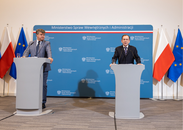-

Non-European Sanctions Act - a Chilling Threat to Political Decisions | 2022-04-29
moreThe Act on Special Measures to Prevent and Counteract Aggression against Ukraine and to Safeguard National Security [hereinafter: the Sanctions Act] signed by the President was intended as a Polish complement to EU actions and sanctions against Russian oligarchs. However, a closer analysis of the content of the Act leads to the conclusion that it may only constitute a sham, which will ricochet off other entities. The main problem is that the procedure for including new entities on the asset-freezing blacklist is extremely short and threatens to be extremely arbitrary. Also, the rules of possible international cooperation, apart from the type of sanctions applied, have not been specified. An additional issue is also the lack of a realistically effective verification procedure prior to the making an entry onto the list, which in turn is characterized by its immediate enforceability.
-

There is no justification for freezing WIBOR | 2022-04-19
moreIdeas of a blanket freeze in WIBOR rates for mortgages make no economic sense. At a time when interest rates were at record lows, banks had a fairly prudent lending policy. So it should be presumed that most borrowers are able to pay higher installments. For people who are actually in a difficult financial situation, support instruments like the Borrower Support Fund at Bank Gospodarstwa Krajowego are already in place. However, the fact that some group may not be able to bear the current burden does not mean that support is due to everyone who has taken out a loan in the past several years.
-

Weakening the economy and state finances undermines national defense | 2022-03-25
moreIn the current situation we do not need creative legal changes, but a plan for building military security, which would not affect the stability of public finances and the development of the national economy. The strategy of irresponsibly increasing state spending and the country's debt may end in very high inflation, further increases in interest rates and destabilization of the economy. This would harm both the defense of the country and the economic situation of citizens.
-

Polish government's involvement in humanitarian aid will not unlock the National Recovery Plan (NPR) | 2022-03-18
moreThe actual actions of those in power, which contradict public declarations of cooperation, almost point to internal sabotage of funds from the EU Recovery Fund, which in fact could have already reached Poland. The European Commission's refusal to proceed with the Polish NRP should be seen in terms of concern for the financial security of the European Union. Poland - apart from refusing to meet the "rule of law" conditions - also refuses to join, for example, the European Public Prosecutor's Office, whose main task remains to conduct independent investigations into possible fraud in relation to EU finances.
-

More out-of-control funding - what can go wrong? | 2022-03-14
moreIn response to Russia's invasion of Ukraine, the Law and Justice government began work on creating two new funds in the state-owned Bank Gospodarstwa Krajowego to finance "systemic aid" and additional military spending. At the moment, the debt beyond the control of the parliament amounts to PLN 260 billion. According to the government's plans, by the end of this year it will amount to PLN 350 billion, and by 2025 to over PLN 400 billion, i.e. about a quarter of the public debt calculated according to the EU methodology. The constitutionality of such actions raises serious doubts.
-

No Business with the Aggressor | 2022-03-12
moreCooperating with Russia is no more a legal threat due to sanctions nor a mere corporate responsibility issue. It has become a much more fundamental issue of morality- argue Ukrainian economists Andriy Boytsun, Dmytro Yablonovskyi, and Oleksandr Lysenko.
-

Facilitating access to regulated professions - effective assistance for Ukrainian citizens and the Polish economy | 2022-03-10
moreOn Wednesday, March 2, information appeared on Polish government websites about the beginning of work on a draft law on assistance to Ukrainian citizens in connection with the armed conflict on the territory of the country. This draft is a good opportunity to carry out the necessary liberalization in the recognition of qualifications for the exercise of regulated professions gained in Ukraine. After the project was submitted to the Parliament on March 7, the changes in the scope of regulated professions proved to be far from sufficient.
-

Security is not just tanks and guns. 7 key issues | 2022-03-07
moreThe war in Ukraine will affect Poland's socio-economic situation through many channels, both in the short and long term. In the near term, we are facing phenomena close to stagflation: a weakening of economic growth and even higher inflation, even double-digit inflation. The short-term outlook is difficult. The economy will be far from balanced and prone to turbulence. We all hope that the war will end quickly. But it will trigger changes in many areas. Perhaps a new "cold war" will begin, which for Poland will mean having to function under a permanent military threat from an aggressive neighbour. Therefore, the strengthening of the country's security must be comprehensive - a broader perspective is necessary, and sustainable systemic solutions are required, including in the medium and long term.
-

Vacant buildings do not account for high housing prices | 2022-01-26
moreAs many as 58% of all vacant apartments remain in the state-owned resources - municipal, workplaces, the Treasury and TBS. The question arises whether a possible tax would not fall mainly on local authorities, whose communal apartments account for as much as half of all vacant apartments. At the same time, such an incentive makes no sense in their case, as numerous vacancies result from the fact that rents of council apartments do not cover the cost of their maintenance, so many of them fall into disrepair. Local authorities have very limited possibilities of raising rents or verifying the income of tenants.
-

